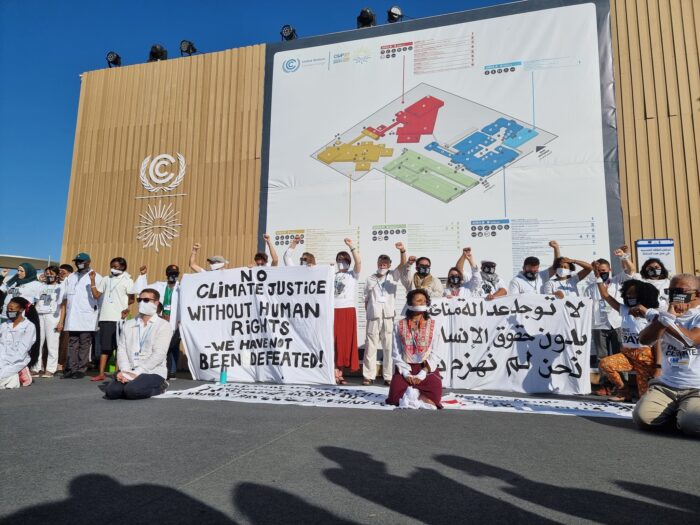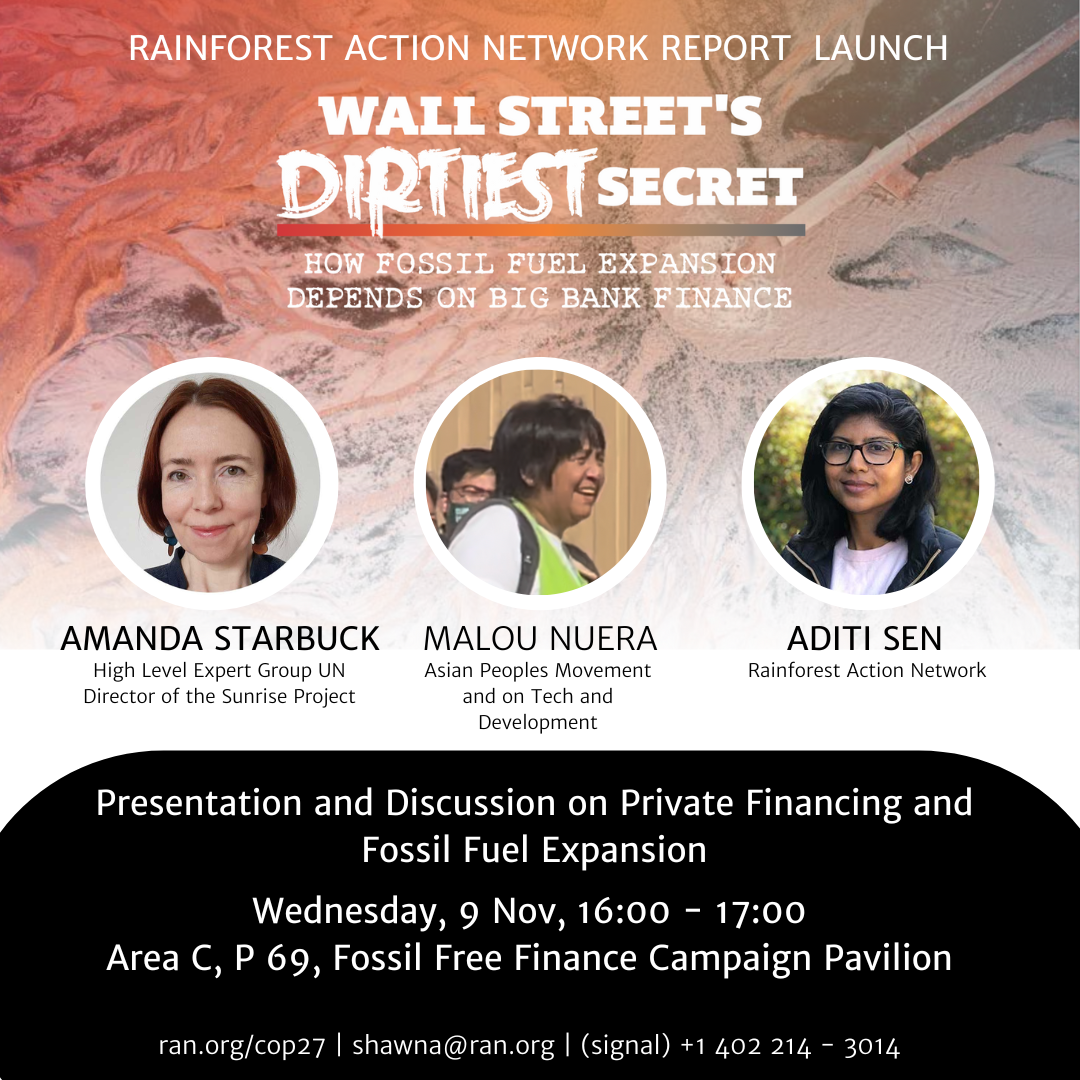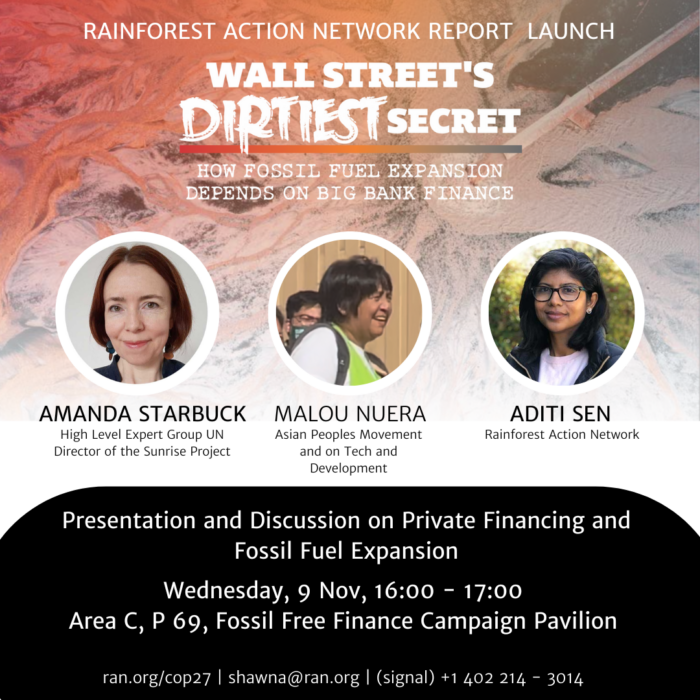Protecting and preserving ecosystems like rainforests and peatlands is critical to any climate solution as they act as “carbon sinks” that store carbon, preventing it from releasing into our atmosphere. Communities on the frontlines of protecting these critical ecosystems protect the climate for everyone. And yet, they have to fend off extractive corporations seeking to exploit these resources for profit, often with little to no regard for the biodiversity, climate, or human rights impacts of their supply chains. This creates an unjust dynamic in which those who are the least responsible for our climate crisis receive little to no help from corporations or the polluting nations of the global north.
27th United Nations Climate Change Conference (COP27)
Last month, we attended the 27th United Nations Climate Change Conference (COP27) in Sharm El Sheikh, Egypt, the annual summit for world leaders, organizations, scientists, and activists to come together and share pivotal plans for our shared climate and future.
RAN advances key policy goals and partners at every COP. Our attendance also means not ceding space to the increasing number of fossil fuel lobbyists that attend COP to pitch their false solutions. And while there are many noble ideals, the conference fell flat once again as it failed to center human rights.
COP defines the landscape of the environmental conversation in the movement to save the planet by saving the people first – and it’s crucial that we are there to support our partners defining the struggle in this way.
Loss and Damage
What this year’s conference really showed was how organized civil society efforts and the nations most impacted by climate chaos are rising in power to stop this dynamic.
Collectively, we won key concessions: a historic pact to enact a loss and damage funding mechanism that reaffirms that nations that have contributed the most to the climate crisis have a responsibility to provide compensation and reparations to impacted communities.
MAJOR disappointments:
-
- COP27 didn’t issue a much-demanded declaration on the urgent need to reduce all fossil fuels.
- Negotiations lasted two days longer than scheduled, and over 600 fossil fuel lobbyists were in attendance, making it difficult for nations to reach agreements.
- Human rights and the crackdown of dissent by the Egyptian government remained a flash point during the whole conference.
Wall Street’s Dirtiest Secrets – Presentation and Discussion on Private Financing and Fossil Fuel Expansion
During COP27, we launched our newest report Wall Street’s Dirtiest Secret, which reveals how the Big 6 U.S Banks have financed $445 billion into fossil fuel expansion since the Paris Agreement.
RAN’s Climate Director, Aditi Sen, was joined by Amanda Starbuck, from the Sunrise Project and UN High Level Expert Group member and Malou Nuera, from the Asian People’s Movement on Debt and Development; Kathrin Petz, from Urgewald, in a discussion about private financing and fossil fuel expansion. Learn more.
COP27 was supposed to be about implementation – how the goals of the Paris Climate Agreement would actually be reached.
Here’s our take on what really happened, and what it means for our work going forward with banks, brands, and insurance companies:
UN High Level Expert Group (HLEG) Report
At COP26 last year, the UN Secretary General set up an independent high-level expert group (HLEG) to craft recommendations on how non-state actors can actually cut carbon emissions. Overall, the High-Level Expert Group on the Net-Zero Emissions Commitments of Non-State Entities report is very useful for key pieces of RAN’s campaigning, especially the call for an immediate halt of all new fossil fuel projects or exploration.
However, the recommendations fall short on what is needed on human rights. The focus must be on Indigenous peoples’ Free, Prior, and Informed Consent (FPIC), as mere consultation allows for abuses and land theft.
Glasgow Financial Alliance for Net Zero (GFANZ)
While the GFNAZ announcement at last year’s COP demonstrated noble intent among the financial industry, a year later, there’s little to show for it. These lofty net zero commitments were hardly mentioned by financial industry representatives on “Finance Day” at this year’s COP, reflecting the weak progress that often comes with voluntary associations.
Forest and Climate Leadership’s Partnership; LEAF Coalition
We eagerly awaited the announcement of the partnership between world governments to keep crucial forests intact and expanded. World leaders from France, Colombia, the United Kingdom, Tanzania, and more made remarkable reports on their progress. But, a troubling pattern was the support for carbon credits and carbon offsets as a way to get money into the hands of people protecting forests and ecosystems — regions the planet needs to survive. One group called this scheme “Blood Carbon” as it creates a system that allows some communities to profit from the exploitation of others.
These false solutions also avoid the essential problem: reducing absolute carbon emissions. Forest preservation or planting more trees cannot solve the crisis humanity is facing.
The LEAF coalition presented the same problematic solution of carbon markets.
Forest and Commodity Trade (FACT) Dialogue
This was the first year that the Forest and Commodity Trade (FACT) dialogue presented results on its progress. This forum was created to bring consumer and producer countries together, but without a focus on human rights, this forum will not achieve its goals of reducing deforestation.
For example, our research shows that deforestation persists in Aceh Timur, a FACT priority district in Indonesia and home to the Leuser Ecosystem — a 2.6 million hectare forest landscape on the Indonesian island of Sumatra and the last place on Earth where Sumatran rhinos, tigers, elephants, and orangutans coexist in the wild. To date, the government of Indonesia has failed to stop deforestation despite the fact that the logging operation lacks SVLK certification — Indonesia’s timber legality certification scheme that is being celebrated by the FACT Dialogue as an example of a trade and market mechanism for sustainable commodity production.

Partner and Coalition Work
An integral part of our COP27 goal was to work with partners and support coalitions. We, alongside partners, hosted a number of events as part of the Fossil Free Finance Campaign.
We had a dedicated pavilion that was an amazing space where we held conversations and strengthened relationships with frontline environmental organizations who were trying to stop dirty energy expansions in their countries. Check out this conversation with two fearless leaders, Sharon and Shamyra Lavigne, from Rise St James, fighting petrochemical expansion in Louisiana.
We also sponsored a side event, The Role of Financiers and Investors in Africa’s and Asia’s Energy Transition, that features panelists Dipti Bhatnagar, JA/FoE, Mozambique; Gerry Arances, CEED, Philippines; Leanne Govindsamy, CER, South Africa; Hasan Mehedi, CLEAN, Bangladesh; and Richard Matey, Executive Director, Alliance for Empowering Rural Communities. As this was the first COP hosted in Africa, this important panel described exploitation and the amazing work civil society is doing to invest in the people of the global south and provide energy independence.
Our partners released several crucial reports at COP27:
- Urgewald published its updated Global Oil and Gas Exit List (GOGEL). GOGEL is a public company-level database that covers 901 oil and gas companies, which account for 95% of global oil and gas production. The updated database shows that 96% of the oil and gas industry is expanding.
- “Who is Financing Fossil Fuel Expansion in Africa” reveals the biggest financiers and companies behind the fossil fuel expansion in Africa. The report shows TotalEnergies is the largest upstream developer in Africa.
- Sierra Club’s “Net Zero Banking Alliance, Net Zero Asset Managers Initiative publish updates at COP27’’ explains what the two alliances updated on and that both of the updates remain low in ambition and disparate, respectively.
Looking Ahead
Convention on Biological Diversity (COP15)
As the UN meets for its Convention on Biological Diversity (COP15) in Montreal, Rainforest Action Network continues its work with allies to pressure governments for the sake of the planet and all people. COP15 represents a key moment in global efforts to progress and potentially finalize a new Global Biodiversity Framework (GBF). A strong GBF could put the world on a path to halt and reverse biodiversity loss, and help to tackle the intertwined climate, inequality and human rights crises. But, rights-holders and civil society groups are raising the alarm about corporations’ efforts to water down ambitions and side-line talks with empty jargon, dubious claims, junk reporting, and dangerous efforts to further commodify nature.
Banking on Climate Chaos 2023
We’ll continue to keep the pressure up on corporations (and countries) through the publication of our Banking on Climate Chaos, which will use the agreements presented at both COP27 and COP15 to present an objective analysis about the effectiveness of these frameworks while pushing to keep forests standing and keep fossil fuels in the ground. This can only be done by centering Indigenous Peoples, women’s organizations, youth movements and peasant organizations who have been at the forefront of driving the true solutions we need to save it. These are the voices that must be valued, amplified and prioritized at all international meetings.
Take action against the Big 6 U.S. Banks financing climate chaos and violating human rights by providing over $445 billion to the world’s top 100 fossil fuel expanding companies.

